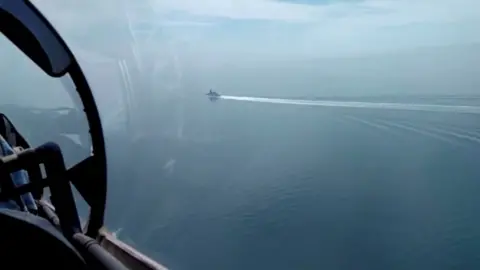HMS Defender: What will be the fallout from Black Sea incident?
 Reuters
ReutersA needless provocation by the Royal Navy or the legitimate exercising of a right of passage at sea?
That depends on your viewpoint.
Britain, strongly supported by Ukraine, insists that HMS Defender was taking the shortest, most direct route across the Black Sea, from Odessa, in Ukraine, to Georgia.
But that route passes just a few miles from the shores of the Crimean peninsula which was annexed by Russia in 2014 in a move condemned by the West and never internationally recognised.
That is not how Moscow sees it.
Despite a raft of sanctions imposed at the time, it has portrayed its annexation of Crimea, with its significant population of ethnic Russians, as returning the peninsula to its rightful owner: Mother Russia.
The port of Sevastopol, close to Wednesday's incident, is home to a major Russian naval base and its Black Sea fleet.
So when a modern, Type-45 destroyer from a "hostile" Nato state (Britain) travels over 6,000 miles (9,656km) from its home port to sail through what Moscow considers are its own territorial waters then Russia sees that as an aggressive provocation.
Hence its angry warnings over the ship's radio and the close-proximity buzzing of the Royal Navy destroyer by Su-24 jets.
Was Britain taken aback by the force of Russia's reaction?
Not really, say defence sources, as they did something similar last year.
But it would be unwise to downplay an incident like this.
Relations between Britain and Russia are already at rock bottom, following accusations - denied by Russia - that it sent two GRU intelligence officers to Salisbury in 2018 to poison a former spy with Novichok nerve agent.
Coupled with the earlier poisoning of Alexander Litvinenko with polonium, Russia's annexation of Crimea, its alleged cyber attacks and the hacking of Western democratic institutions, there is almost zero trust between the two countries.
A recent Whitehall report described Russia as the greatest military threat facing this country.
It is important to bear in mind that Russia considers the whole of Ukraine, the Black Sea and the Crimea peninsula as its "near abroad" - its own back yard.
With the former KGB Col Vladimir Putin firmly ensconced in the Kremlin, there is a permanent paranoia about the West's intentions.
Just 30 years ago Russia was at the heart of a massive empire, the Soviet Union, which, together with its Warsaw Pact allies, stretched all the way from the borders of Germany to Afghanistan and beyond.
Today, many of those former territories and allied states, such as Poland and the Baltic states, have joined Nato.
So Russia feels surrounded, and that is a dangerous place to be.
Yet as dramatic as Wednesday's events appear, this could end up being just a dress rehearsal for a bigger test to come.
HMS Defender is part of the Carrier Strike Force, spearheaded by the Royal Navy's new aircraft carrier HMS Queen Elizabeth.
It peeled off earlier this month to make this Black Sea visit while the rest of the force exercised in the Mediterranean.
As part of the UK's new "forward-leaning" foreign and defence policy outlined in the government's recent Integrated Review, the strike force will soon be heading eastwards to the South China Sea.
There, together with other nations, it will be challenging China's claims to a vast contested area of sea bordering several countries.
Chinese air and sea patrols, often operating from artificially built reefs, have been warning shipping away from this area which Beijing considers it to be part of its own territorial waters.
The West, and other countries in the region, disagree as an international ruling found against the Chinese move.
But when the carrier strike force sails through the South China Sea there will be a lot of people holding their breath to see how China reacts.


